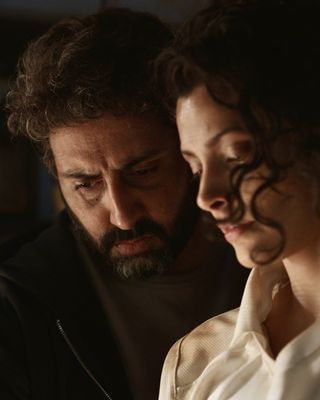Despite several box office disappointments, Bachchan Junior, as he is popularly referred to, remains passionately committed to being a character actor. “For me, every project I do becomes my dream project. If it isn’t the case, there is no point in doing it at all,” he said. Abhishek Bachchan, with a burnished skin and a full beard, looks imposing and charismatic. We are at Janak, the family’s bungalow next to Jalsa (where Amitabh and Jaya reside), and Pratiksha (where Abhishek and Aishwarya live along with their daughter).
As we begin the conversation there arrives a plate of chocolate biscuits, and by the end of the interview, Bachchan has had them all. “This is also intentional,” he told me, “It is a part of the character I have to play in Shoojit Sircar’s next that I must binge on all this in order to look a certain way. We don’t get to live our lives; it is dictated by the work we are doing at that point of time.”
Excerpts from the interview:
Q\ How did Ghoomer happen?
A\ [R.] Balki and I keep bouncing ideas off each other. The first time we did a film together was Paa (2009). After that we discussed ideas but nothing fructified. This time we managed to put it all together. In the case of Ghoomer, I liked the very concept itself. I play a coach of a paraplegic. The characterisation came much later. But it is not that I went ahead because Balki pitched it. Somewhere, as an actor, you have to be convinced about what you are doing. To me, Ghoomer is about the triumph of the human spirit. It is an inspirational story of two opposite characters and how they find common ground and work towards acheiving their goals. Also, it is about cricket. I have never considered and nor do I still consider Ghoomer to be a cricket film. That’s just the backdrop.
Q\ You have had some hits and some misses in your career. Does your approach towards greenlighting scripts change after the previous film hasn’t performed well?
A\ No. The criteria remain the same always. When I read a script I try and gauge if that is something I would like to see as a film. And, if it is, then I should do it. It is immaterial whether the previous film is a success or not.
Q\ We don’t see you aggressively promoting your films.
A\ No, I don’t agree that I don’t promote my films enough. In fact, I have been one of the few who goes out of my way to promote. We launched the trailer [of Ghoomer] and the day after that I was busy doing interviews. Then, yesterday night, I attended an event. So, I am busy every day. In the last three to four years because of the pandemic I couldn’t really go out. But we [his team] do whatever is required.
Q\ You have been focusing on doing only one film a year. Why is that so?
A\ I think it is really weird when people say that. In the last five years I have done more work than any other time. I think the style of working now is to do one film at a time. The economics of filmmaking is turned out to be like that. But I have always done multiple films. Currently, I have three films that are in post-production. One is about to release. I leave at the end of this month to shoot my next. In the last three years I have shot seven or eight films.
Q\ Most of your recent releases have been on OTT, including Ludo (2020), Big Bull (2021), Bob Biswas (2021), Dasvi (2022), Breathe: Into the Shadows (2022). Your last theatre release was Manmarziyaan in 2018. Each time your character has been vastly different from preceding one.
A\ Life is difficult, right? Yes, I think the last romantic drama I essayed was Manmarziyaan with [Anurag] Kashyap. But I haven’t had the opportunity since. If something like that comes across I would love to do it. My roles are diverse and it is difficult to keep that momentum going. I mean the audience will get terribly bored if we did the same thing every time. You need to keep showing a new facet of yourself without reinventing yourself.
Q\ In Bollywood, the success of an actor depends on his performance at the box office. How true is this for you, especially when most for your theatrical releases do not fetch the kind of numbers expected?
A\ Of course, it is the absolute and the only truth that box office success is everything and more. There are no two ways about it. We are a commercial art form. We expect our audiences to purchase a ticket; so the box office figures of your film are of paramount importance. The audience seldom decides to love somebody. And if they do, you have to respect that and work hard every day to honour that. There are going to be films that they like and films that they don’t like. That is okay. It is not the end of the world. Learn from it, move on and rectify it in the future.
Q\ Which film made you the most popular and the most loved?
A\ I don’t know which one, and not having an answer to that might be a good thing I suppose. I did not think about it, although I introspect a lot. But I don’t like my performances anyway. Whenever I revisit my films I find a lot of mistakes [in them] that I think I could have improved upon. I’m not happy with any of my performances. Not even with Guru. Today, when I look back, I can see so many things that could have been better. I watch my past films regularly.



